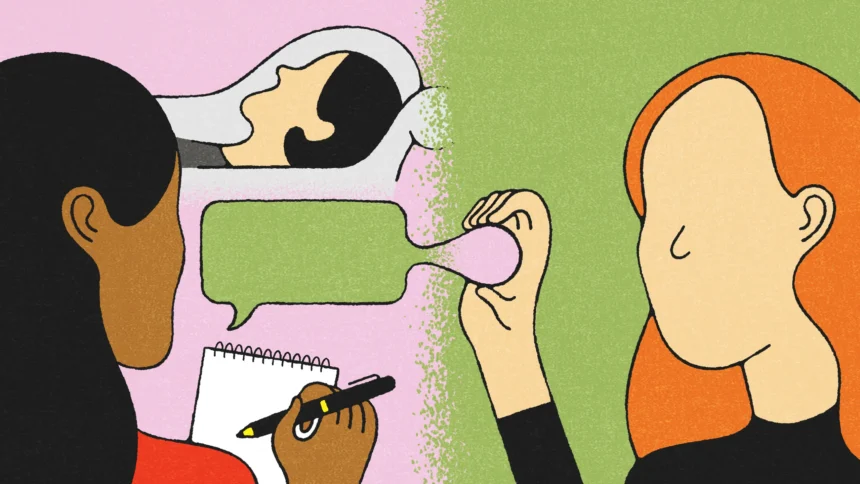Therapy-Speak Goes Mainstream: Why Everyone Sounds Like a Therapist Now
Suddenly everyone’s “holding space,” “establishing boundaries,” and “processing trauma.” No, you didn’t wander into a group therapy circle — you’re just at brunch. Welcome to 2025, where therapy-speak is the new small talk.
🧠 You’re Not Ghosting, You’re “Protecting Your Peace”
Therapy-speak is that ultra-sanitized, hyper-self-aware way of talking that used to live in therapists’ offices — but now it’s in your DMs, your TikTok feed, and probably your friend’s break-up text. Think:
- “I’m setting a boundary.”
- “This dynamic no longer serves me.”
- “You’re not respecting my emotional bandwidth.”
At its best, it’s about emotional intelligence. At its worst? It sounds like ChatGPT and a therapist co-wrote your last fight.
📲 TikTok Made Me Talk Like This
If you’ve ever wondered how we got here, you can thank TikTok. Creators like @sabrina.cinoman.brier nail the vibe with sketches poking fun at therapy-speak overload:
“I’m gonna take some space to process this. It’s not about you. It’s about my inner child.”
— @sabrina.cinoman.brier, TikTok
The hashtag #therapyspeak has racked up over 180 million views, and phrases once reserved for trauma work are now TikTok captions on roommate drama.
🧃 From Clinical to Casual: Why Everyone’s Talking Like a Therapist
It started with good intentions. More mental health content = more awareness, right? But somewhere along the way, TikTok’s DIY-therapy pipeline blurred the line between empathy and emotional jargon cosplay.
Even Wired put it bluntly:
“When self-help meets virality, therapy-speak becomes the dominant dialect.”
— Wired.com
Now, words like “gaslighting,” “trauma,” “narcissist,” and “toxic” are tossed around like confetti — often missing the weight they carry.
🧩 Real Reactions: Social Media Calls It Out
The internet isn’t letting this one slide.
“Every conflict doesn’t mean someone’s a narcissist. Sometimes they’re just a jerk.”
— u/BoundariesAreNotBullets, Reddit
“I told my ex we needed to talk. She said she didn’t have ‘emotional bandwidth’ that day. Girl WHAT.”
— @jadedtherapist, X
Some find comfort in the language. Others say it’s giving ✨gaslight gatekeep girlboss✨ — with a therapy-scented filter.
🧠 When Boundaries Turn Into Buzzwords
Here’s the deal: therapy-speak can be powerful when used right. But experts warn that it can easily slip into a shield for avoiding accountability.
Psychologist Dr. Lauren Cook notes that people sometimes use these terms to opt out of discomfort instead of working through it.
“Saying ‘I’m setting a boundary’ isn’t a get-out-of-conflict card. Communication still matters.”
— Forbes
Translation: calling your roommate “toxic” because she asked you to do the dishes? Not the healing journey you think it is.
🧘♀️ So… Is Therapy-Speak Bad?
Not inherently. It’s great that people are more open about mental health, boundaries, and emotional needs. But just like you wouldn’t self-diagnose on WebMD, you probably shouldn’t build your whole communication style off of a stitched TikTok.
“The problem isn’t therapy-speak. It’s therapy-speak without therapy.”
— Dr. Jessica Stern, NYU Clinical Psychologist
🔗 Related Read: How Beige Flags Became Gen Z’s Favorite Relationship Quirk
Because not everything needs to be toxic — sometimes, it’s just odd and beige.
🧠 So How Do You Spot Real vs. Performative Therapy-Speak?
Here’s your cheat sheet:
| Phrase | Healthy Use | 🚩 Cringe Use |
|---|---|---|
| “I need space to process.” | Taking time during a real emotional moment | Ghosting without warning |
| “Setting a boundary.” | Expressing personal limits | Silencing any disagreement |
| “This is triggering me.” | Acknowledging trauma responses | Avoiding minor discomforts |
| “They’re gaslighting me.” | Distorting facts to make you doubt reality | Disagreeing with you |
Like with all trends, context is king. Communication isn’t therapy — it’s human.
📚 Where It Goes From Here: Talk Like a Human Again?
Some creators are already pushing back. The “anti-therapy-speak” wave is growing, with TikToks encouraging people to say what they actually mean:
“Just say you’re mad. You don’t need to ‘honor your feelings’ every time someone forgets to Venmo you.”
— @emotionallyhonestera
Mental health influencers now pair therapy-speak content with disclaimers like “Not a substitute for actual therapy” — which is a step in the right direction.
And according to The New York Times, even therapists are getting exasperated with clients parroting buzzwords with zero context.
🧠 FAQ: Breaking Down the Buzzwords
What is therapy-speak, exactly?
It’s the casual use of psychological terms like “trauma,” “boundaries,” and “gaslighting” in everyday conversation — usually inspired by online therapy content.
Why is it trending now?
TikTok, online therapy influencers, and pop psychology have made therapy-speak part of Gen Z and millennial lingo — for better or worse.
Is it a bad thing?
Not always. It depends on context. Used thoughtfully, it builds emotional literacy. Overused or misused, it can water down serious terms.
How do I know if I’m using it wrong?
If you’re quoting therapy language to avoid a convo, dodge accountability, or sound emotionally superior — it’s time to reevaluate (maybe… in therapy).









